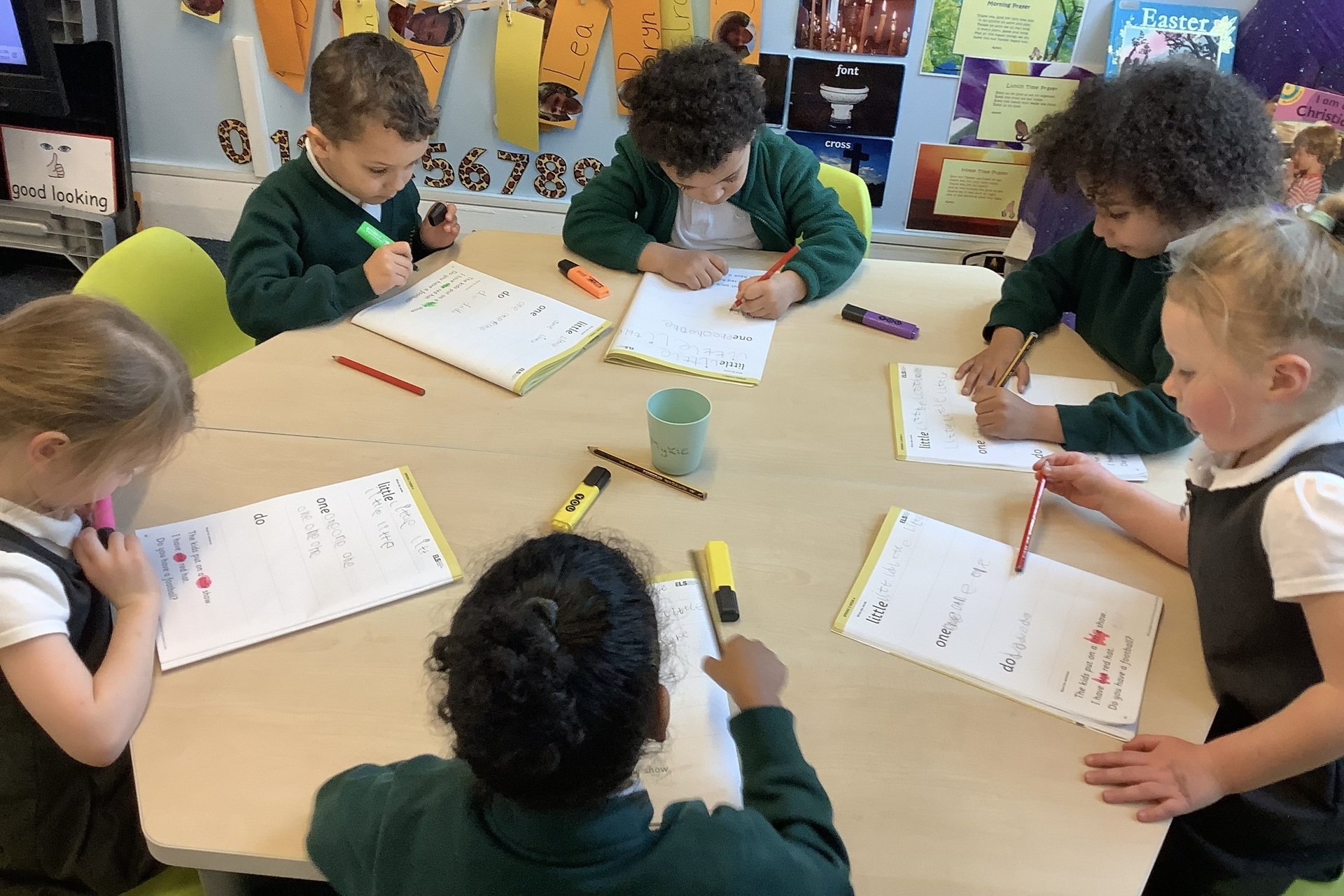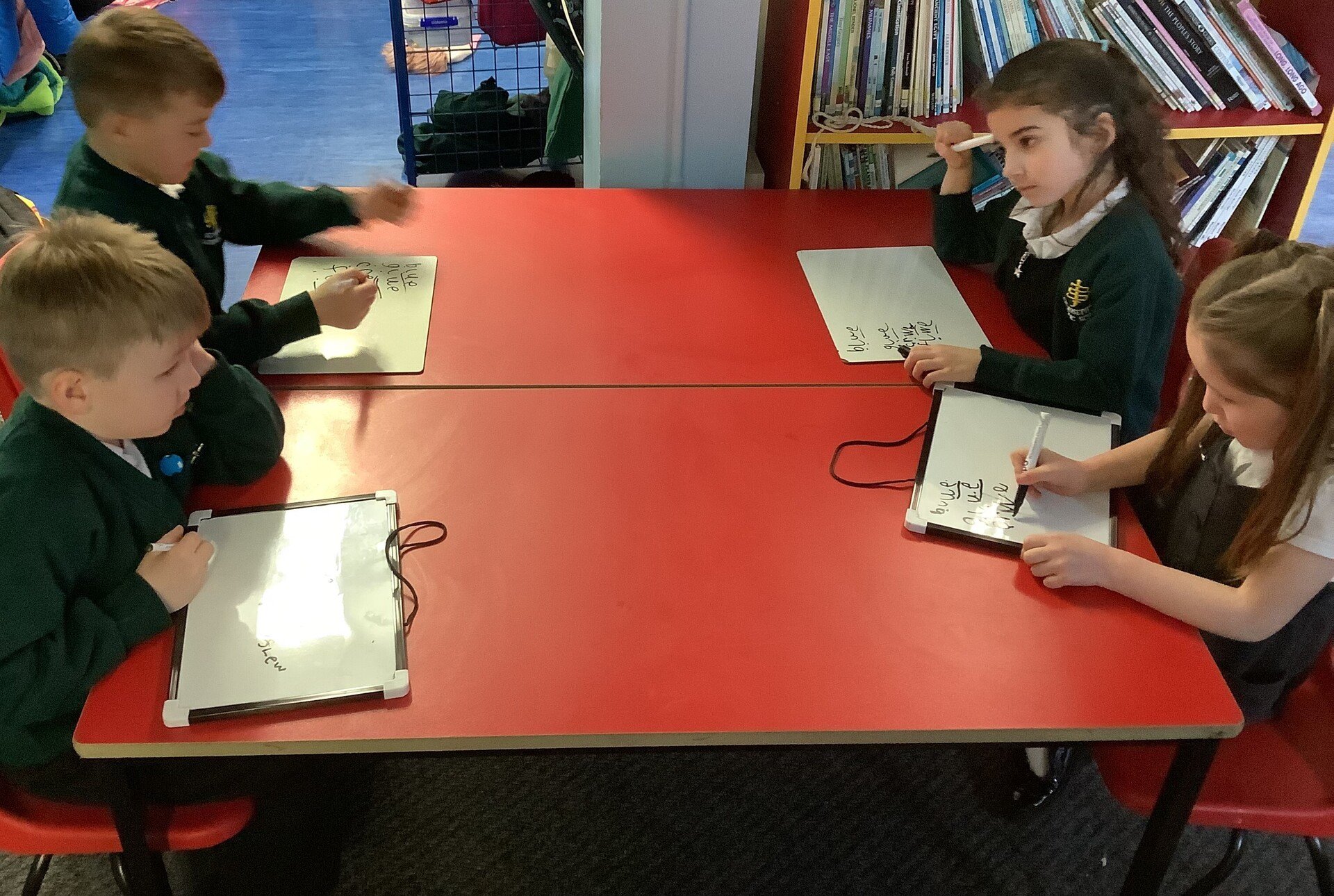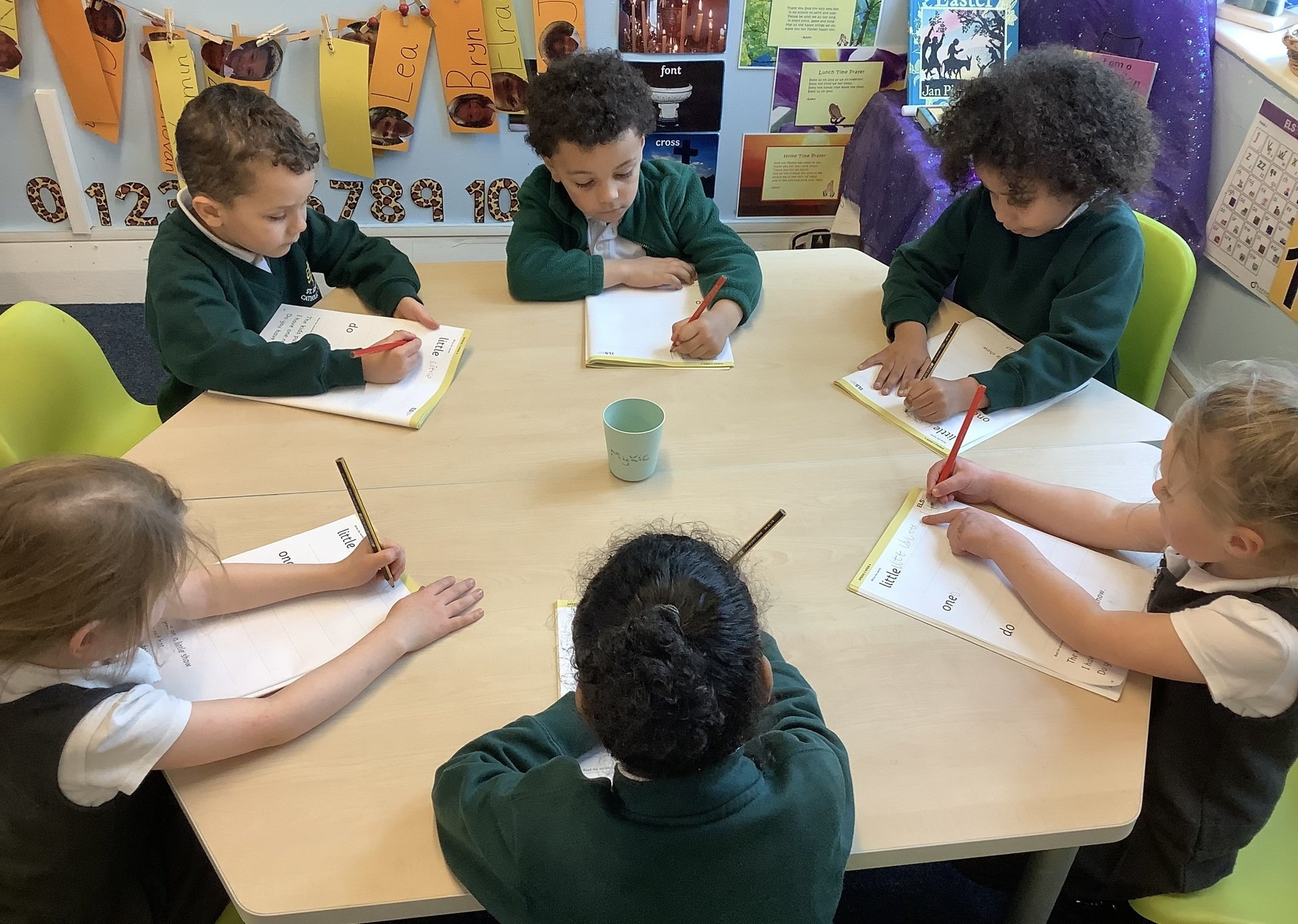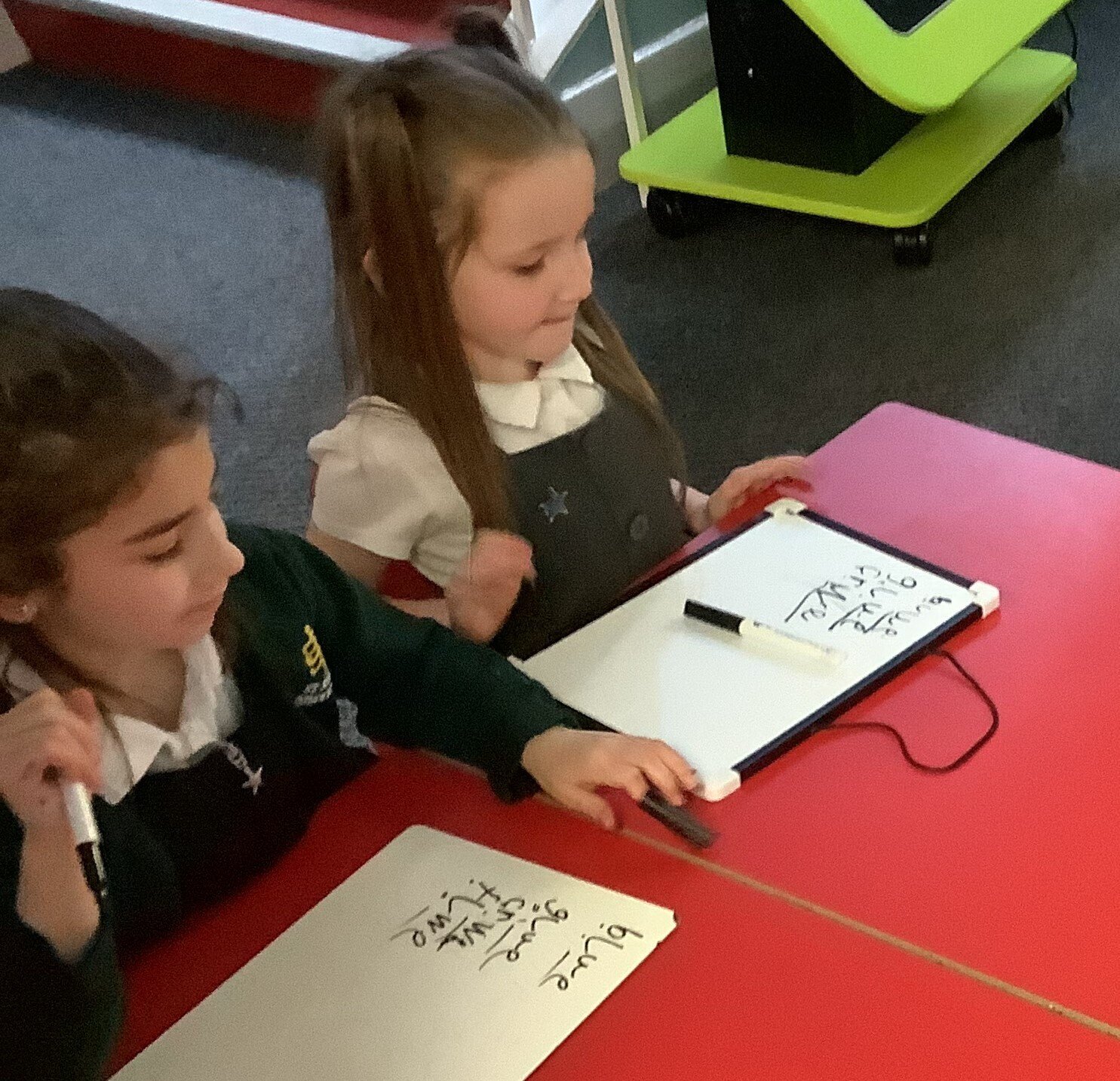English
Welcome to the curriculum page for English:
At St Joseph's, we encourage a love of reading and writing and teach daily English lessons. Children have the opportunity to develop their reading, writing, phonics, handwriting and oracy skills across the curriculum as well as in specifically designated daily English lessons. We constantly strive to provide our children with a varied, rich and stimulating experience of language.
SPAG
SPAG (Spelling, Punctuation and Grammar) is delivered across the school in discrete lessons but is interwoven through all aspects of reading and writing.
A lot of our SPAG teaching is delivered through games and active learning activities. Here are a few photos:


L.O. I am learning about different L.O. I am learning about the L.O. I am learning that modal verbs indicate types of conjunction. three simple verb tenses how likely something is to happen.


L.O. I am learning about verbs. L.O. I am learning about common L.O. I am learning about the function . homophones. of an adverb and the different types.
By the end of Key Stage 2, your child will be expected to know these grammatical terms and punctuation marks, be able to explain what they are, their purpose and identify them in sentences, as well as use them in their own writing.
Click HERE to download the above SPAG support sheet.
.

At St. Joseph's, we love to read. Books are held up as a key source of inspiration to our pupils. Each class has a well-stocked and inviting book corner with a range of books, newspapers and texts that stimulate and challenge children in their reading choices. Children are given regular opportunities for individual reading, shared reading, guided reading and class reading. At St. Joseph's we teach English using the Power of Reading approach. We use high quality texts to teach creatively using a variety of teaching techniques. We immerse the children in the chosen texts, developing expressive language to use in their writing. We know that this increases their engagement with books and reading.
Here are some of our Power of Reading displays showcasing our writing and the journey we went on to get to the finished pieces:





If you would like to find out more, visit The Power of Reading website.
Reading Together
We encourage parents to read with their child daily. Reading skills are taught at school but children need to practise at home, often, to become independent, successful readers. Please write in your child's reading record book whenever you read with them. Any adult that reads with your child will also write in their book. We love to hear their ideas about the story or how well they are understanding the texts
Click on the link below to find out the key objectives your child is working on in reading:
Have a look at Julia Donaldson's tips for reading at home with your child aimed at KS1 children.
Click HERE for the information shared at our Parents and Carers Early Reading Workshop


Writing
We actively encourage all children to view themselves as practicing authors. Our aim is to see all our children leave St Joseph’s feeling confident in their own writing abilities. At St Joseph's, we use quality texts as a stimulus for children's writing, across different genres. From the earliest experiences in the Foundation Stage right through to Year 6 , our children are exposed to a wide variety of first-hand experiences and a broad range of text types to engage, inspire and stimulate their imaginations. We believe that these rich experiences provide children with opportunities to develop their language skills and create a love for writing.
Children in the Early Years have many opportunities to write using a range of media they take part in the Write dance programme to develop their letter formation.
At St. Joseph's, we know that children need to say a sentence or a story before they can write it. We bring texts alive using creative activities such as art and drama. This immerses the children into a story. It helps them to identify with the characters and situations giving them opportunities to use emotive language and visual literacy.
Children in Early Years, Year 1 and 2 have a checklist on each page of their books when doing any writing, reminding them of what they need to include in their work. They are given opportunities to self assess their writing against the checklist, as well as time to edit and improve their work with a "purple polishing pen."
Children in KS2 also have plenty of opportunities to write and are taught to write for a range of purposes. They learn about the features of different genres. KS2 pupils also have a checklist to refer back to in order to make sure they have all the necessary components in each piece of writing.
Children are encouraged to plan, draft, edit and improve their work using a range of classroom resources.
At the end of each unit, children in KS2 complete a self or peer assessment, finding evidence in their pieces of writing to show they have fulfilled the success criteria and highlighting their next steps.
Here are the Writing Key Objectives by year group, click on the link below to find out the objectives your child is working on in writing.
Phonics:
At St Joseph's, children learn phonics throughout the EYFS and Key Stage 1. Phonics is the first important step for children in learning to read. Research shows that when phonics is taught in a structured way – starting with the easiest sounds and progressing through to the most complex – it is the most effective way of teaching young children to read.
Phonics is taught daily in 30 minute sessions so that children can build up and practise the skills they need to use in reading and writing. Practising the sounds correctly is really important. We use the approved, "Essential Letters and Sounds" scheme for teaching phonics at St Joseph's.
Find out more by clicking on the links below:
Click 'Here' for a PowerPoint for our ELS scheme and how you can support reading at home.
For spelling, children should repeat the word, stretch it out, use robot arms to segment the sounds, count the sounds and then read the word back (adding sound buttons to it) to self-assess they have all sounds within the word.
Click 'here' for a video of a 'walk through' to our phonics lessons.
In our phonics lessons we also have an application part where they practise writing and spotting learnt sounds within a word or sentence and practise spelling harder to read and spell words.

Please see examples below, of pupils using sound buttons and support their phonological awareness, spellings and blending:

EYFS
We follow Essential Letters and Sounds.
Year 1
Your children are now in Key Stage 1
In Year 1 we follow the Essential Letters and Sounds programme further
This is the start of the National Curriculum
This will be the first encounter of a DfE test at the end of this year the Phonics Screening Check
What is the Phonics Screening Check?
- A quick and easy check of children’s phonic knowledge
- Divided into 2 sections each section containing 20 words, a mix of real words and non-words
- Children work 1:1 with their teacher for approximately 9 minutes
- It is a test of decoding skills
- The pass mark has in the past been 32 / 40 although this is subject to change and we are not informed until after the test
- The majority of children are expected to be able to pass this test
Year 2
By Year 2 we will have learnt all of the sounds there are to learn! Although we still need to be using them in our reading and writing! We can:
- Automatically read familiar words
- Decode unfamiliar words
- Decode complex words by sounding them out
- Become more fluent readers and more accurate spellers
In Year 2 the knowledge of graphemes and phonemes is constantly revised , the children use their phonics knowledge to read and write.
- We continue to learn about spelling rules, suffixes, prefixes, homophones; how to use adverbs.
- Common exception words Download a-Common Exception Words Bookmark to help with those tricky words!
Phonics Play
Free phonics games and printables
Spelling Play
Spelling games and fun ideas
BBC Bitesize Phonics
Fun games to support children with their phonics learning
BBC Skillswise – Syllables Factory
A game to support with breaking words down into syllables
ICT Games
A variety of games to help with spelling and phonics
Education.com
A blending sounds spelling game









